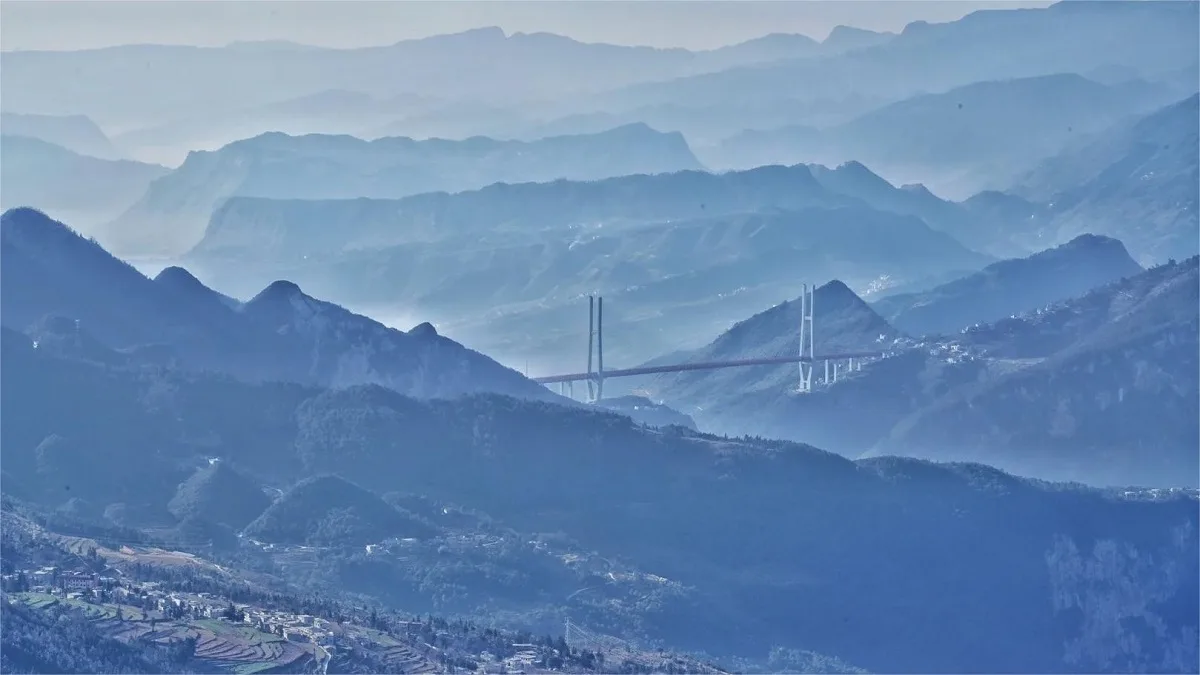The Beipanjiang Grand Canyon (北盘江大峡谷) originates from the Kuragawa and Kedu Rivers at the border of Yunnan and Guizhou provinces. It flows through Shuicheng County and Liuzhi Special District in Liupanshui City, with a total length of over 100 kilometers. The section spanning nearly 40 kilometers in Zhenfeng County, Guizhou Province, is the most rugged, with towering cliffs and continuous peaks. The river meanders through the canyon, sometimes flowing eastward and sometimes southward, forming intricate “S” shapes and presenting formidable challenges. Several iron suspension bridges dating back to the late Qing Dynasty still span these sections of the river. Along the canyon, one can also find habitats for protected species such as the black-leaf monkey. It is a rare and remarkable sightseeing destination renowned for its breathtaking natural beauty and unique geological features.
Table of Contents
Basic Information
| Estimated Length of Tour | Half a day |
| Ticket Price | Free |
| Opening Hours | 24 hours a day throughout the year |
Location and Transportation
The Beipanjiang Grand Canyon is situated at the junction of Zhenfeng County and Guanling County in the Qianxinan Buyi and Miao Autonomous Prefecture of Guizhou Province, near Shuangru Mountain. Due to its relatively remote location, visitors typically travel to the canyon by self-driving or joining organized tour groups.
Highlights of Beipanjiang Grand Canyon
Huajiang Gorge

The segment of the Beipan River that flows through the town of Beipanjiang in Zhenfeng County is affectionately referred to by locals as Huajiang, or Flower River. Legend has it that in ancient times, the cliffs on both sides of this stretch were adorned with abundant flowers, and during spring and summer, the blooming blossoms would cascade into the river, creating a colorful spectacle on the jade-green waters. This picturesque section of the canyon became known as Huajiang Gorge, attracting visitors with its stunning natural beauty and rich cultural heritage. The steep and continuous mountains, along with the turbulent waters, form the backdrop for local folk songs, which narrate tales of the challenging journey through this rugged landscape.
Huajiang Iron Suspension Bridge

Dating back to the Ming Dynasty, the Huajiang Iron Suspension Bridge has been an essential link connecting Zhenfeng and Guanling counties. Over the centuries, numerous attempts were made to construct bridges in this area, only to be thwarted by floods or destroyed by marauders. During the Guangxu era of the Qing Dynasty, General Jiang Zonghan raised funds and spent six years building this remarkable bridge, which spans 71 meters in length and stands approximately 70 meters above the river. Despite enduring floods and even aerial bombardment during World War II, the bridge has remained steadfast, serving as a vital artery between the two counties and a key transportation route between Guizhou and Yunnan provinces.
Beipanjiang Grand Bridge

The Beipanjiang Grand Bridge, spanning 486 meters in length and towering 388 meters above the canyon floor, is an engineering marvel that holds the distinction of being the highest bridge of its kind in China and the second-highest in Asia. Crossing this section of the canyon, characterized by its pristine natural environment and rich biodiversity, the bridge offers panoramic views of the lush greenery, rugged cliffs, and abundant wildlife that thrive in the area. From the vantage point of the bridge, visitors can admire the majestic karst landscape, with its towering cliffs, cascading waterfalls, and mist-shrouded valleys, creating a scene of ethereal beauty that evokes a sense of wonder and awe.


